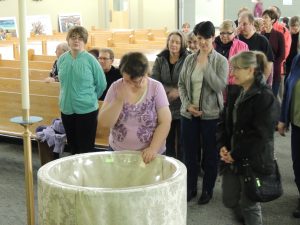WEEK 02 04
Pray for Peace; Work for Justice
(Jer 17:5-10; Ps 1; Lk 16:19-31)
**********************************
Have you ever seen the bumper sticker “If you want peace, work for justice?”
The readings today present us with a tweaked version: “If you want to live in joyful serenity, pray for peace and work for justice.”
The first two readings are all about faith and prayer. For Jeremiah, unbelievers who trust in themselves are cursed while believers who trust in God are stable and secure.
The psalmist proclaims that those who hope in the Lord and who meditate on the Law, who pray with it and ponder it, are not only happy but also filled with delight and joy.
 Both the readings use the image of a tree planted and deeply rooted by running streams, withstanding drought and bearing much fruit, as a symbol for those who are rooted in faith and prayer.
Both the readings use the image of a tree planted and deeply rooted by running streams, withstanding drought and bearing much fruit, as a symbol for those who are rooted in faith and prayer.
The gospel takes us down a different path of justice that balances the first two readings on faith and prayer. Jesus recounts the sad story of Lazarus, a rich man, who ignores the poor at his gate. Lazarus is not a bad man – just indifferent to the plight of the poor, and unresponsive to it. His sin is a sin of omission and not caring. Perhaps he was prayerful, but did not express his faith with compassion and active caring.
Then Jesus returns to the theme of prayer, but with a caveat that brings in justice. The brothers of Lazarus should “listen to Moses and the prophets.” That is an allusion to prayer, but prayer rooted in justice, for both Moses and the prophets were very strong on justice. In fact, Isaiah almost shockingly proclaims at the outset of his book “Zion shall be redeemed by justice, and those in her who repent, by righteousness!” (Is 1:27)
That does a number on Christians who claim we are saved by faith alone. Here Isaiah, and many other prophets, are kindred spirits with the letter of James where he proclaims unequivocally and repeatedly, “I by my works will show you my faith” (2:18), “faith apart from works is barren” (2:20), “faith is brought to completion by works” (2:22) and “For just as the body without the spirit is dead, so faith without works is also dead” (2:26). This alone should be enough to put an end to religious addiction that hides from the pain of humble service behind devotions, preaching, and reciting many prayers.
It is this awareness of the need to balance faith and works that led Richard Rohr OFM to found a Centre for Action and Contemplation. That in itself was a prophetic initiative.
St. Mother Theresa of Calcutta is another person we can emulate in her dedication to contemplation and the Eucharist, grounded in a faith she then expressed through her exemplary ministry of reaching out to the poor and dying of Calcutta.
That need to express our faith through concrete ministry is the message Pope Francis is constantly trying to impress upon the Church – to go to the peripheries, to the marginalized, to not just give to the poor, but to touch them, to look them in the eye, to interact with them, to relate to them, to treat them like human beings and offer them the gift of dignity.
Jean Vanier has a saying, “The poor are always being given to. The best thing that we can give them, and the gift they need the most, is dignity. We can give them that gift by allowing them to give us something, even if it is only a cigarette, and that will give them dignity.”
I know that learning the Cree language, with the help of a Cree resource person and immersion into a Cree community, was to take the stance of a learner receiving from them. That, I believe, was also giving the gift of dignity to the Cree people from whom I was receiving.

Renewing baptismal commitment
The psalm points out that happiness and delight comes from faith and prayer. I can almost hear Jesus adding that joy and serenity will flow from being generative and working for greater justice in our society. I know that personally I have experienced greater purpose, focus and joy ever since I began the Serene Hope Foundation to help the unfortunate in a way that respects their dignity. It is a joy to involve so many others in an initiative that balances our faith with working for greater justice.
The Eucharist is itself a living out of today’s readings. It is our greatest prayer, through Word and Sacrament, but it also commissions us to go out to serve the poor and work for greater justice in our society.
So remember, if we want to experience greater joy and serenity in our lives, let us not only pray for peace, but also work for justice.




Let us pray for peace and justice as we try to change this world from hatred, power , fame , jealousy, bitterness, anger issues towards other people. We need to work for justice by changing the law and justice with in the government and countries. It is just like us we can have the unconditional love that has mercy and love to forgive people who have hurt us all the time. We need to understand what is right and wrong and what is good and evil in this society. Also giving our time up to help the poor and spending time with them is working for justice. We have compassion and love to care for these people even the lonely people . It is also visiting people who are sick in the hospital or at homes if you care for them. It is just like Mother Theresa and Pope Francis visiting orphanages , support groups in countries; they are visiting poor countries time and time again because this is their mission from Jesus Christ. They are Christlikeness as they express their love and forgiveness to have justice. We should use their experience to deepen our faith and understanding. Amen.
Thanks for the stories and experiences relating today’s readings . I agree with it ; I love St. Mother Theresa and Pope Francis they are a role model that comes from visiting the poor and helping the poor. Thanks again Bishop Sylvain Lavoie. Your homilies is a reality and pretty clear what we need to do .